We use cookies to ensure that we give you the best experience on our website. If you continue without changing your settings, we will assume that you are happy to receive all cookies on the Business Car website. However, if you would like to, you can change your cookies at any time

The start point for the best source of fleet information |
Final report: Volkswagen Passat long-term test
Date: 22 March 2021 | Author: Simon Harris
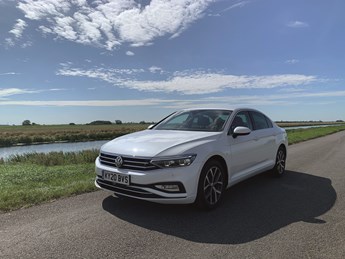
|
|
||||||||||||
Final Report: Bowing out gracefully
We took delivery of the Volkswagen Passat at the height of the summer of 2020. Our long, spring lockdown had gradually released us from its grip (although with hindsight perhaps that the country wasn't quite ready), and we looked forward to being on the road again with a few necessary business journeys.
We specified our Passat late in 2019, expecting a March/April 2020 delivery. Of course, we could have chosen the Passat GTE plug-in hybrid, which certainly promises savings in BIK tax and employers' national insurance contributions.
But as drivers need to change their mindset with PHEV, and be encouraged to take advantage of charging the car from the electricity supply, using the engine as a back-up for occasional longer journeys, we decided the diesel would be more appropriate for my 30,000-miles-a-year lifestyle.
The coronavirus pandemic has, of course, created a shift in how we use vehicles. Most of the time, during the past year, business meetings have been held by video, although car sharing and travelling by public transport have become less desirable.
As a result of lockdown disruption affecting the automotive industry over the past year, the Passat arrived with us three months later than originally expected, and while it seemed to be everything we wanted, our mileage in it would be substantially reduced.
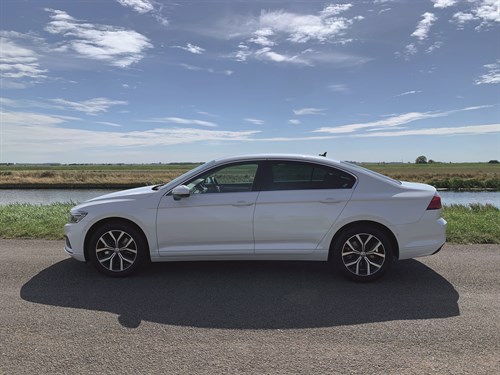
In the six months from the end of July 2020 to the end of January 2021, the Volkswagen only covered 6,300 miles - around half of what we might have anticipated in normal times.
And although it covered them exceptionally efficiently - and long journeys in a way that only the best diesel cars can - it has left us wondering if the number of high-mileage drivers on the roads after the pandemic will be substantially smaller.
It's a pity, as the Passat is extremely capable at that kind of long-distance trip. The 150hp engine combined with the seven-speed DSG automatic gearbox provided a relaxed environment, usually achieving well in excess of the official WLTP combined fuel consumption figure of 53.3mpg.
A few times after refuelling and the average fuel consumption on the trip computer had been in the mid-60mpg area, and the range had been showing a near intergalactic 980 miles of range.
Even though that turned out to be about a month's driving during the pandemic, it was also good news that there would be fewer visits to filling stations and increasing the risk of catching or spreading Covid-19.
But if reduced mileage is to become the norm, perhaps the savings in fuel costs offered by diesel will take much longer to realise, and pushed beyond a three-year term on a fleet.
Based on that, and the enticing incentives for choosing a pure EV for the next few years, perhaps if I was choosing now, cars like the Volkswagen ID3 or ID4 might well be on my radar. With the options fitted, our Passat was edging closer to the £40,000 mark, making those kinds of vehicles accessible.
If I was really making that choice, I would spend a while weighing up the benefits. But that's not to take anything away from the sterling service the Passat has provided in the past six months. It really was a class act. But the past tense will become ever more applicable in these changing times.
6th Report: Winter takes its toll
Sequels are rarely as rewarding as what came before, and this appears to be the case with 'Lockdown 3'.
The Business Car team has been working from home since mid-March 2020, and while the first period of reduced activity had more of a holiday feel, with the lengthening evenings of the approaching summer, Lockdown 2 and Lockdown 3 have been more of a disappointment.
Our Volkswagen Passat joined the Business Car fleet in the heady days of late summer, with reducing restrictions and optimism that the coronavirus was in decline.
Long journeys were still rare, but they did happen, and the car's super-efficient diesel engine had many opportunities to get into its stride and deliver economy well in excess of the official combined figure of 53.3mpg.
The shorter second lockdown in November 2020 blurred into the tier system, which we barely got to know, and suddenly, post-Christmas, many activities became taboo again, all with good reason as the government tried to control the spread of coronavirus once again.
On the rare recent occasions I've had to drive the Passat, it has often been shrouded in a layer of ice, as heavy condensation on the car has frozen.
While it's equipped with heated front seats to banish chills from the nether regions on cold days, this is perhaps when we would really have noticed the benefit of a plug-in hybrid version, capable of heating the car to the desired temperature while plugged into an electricity source.
And before anyone asks if I've ever heard of de-icer spray, of course I use it, but the car's ventilation system has also taken a few minutes to clear the glass of condensation on the inside.
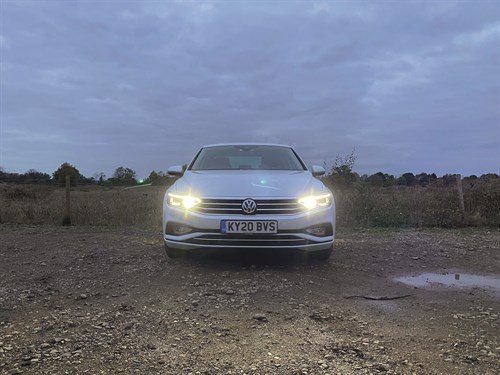
The result is the car spends a few minutes idling, which has taken the edge of its exceptional fuel economy so far (at the end of some of those longer summer journeys it was approaching 70mpg, according to the trip computer, and had been achieving a genuine 60mpg-plus with full tanks).
This has also been exacerbated by the shorter journeys, which have become more typical in recent months, whether a weekly trip for groceries or trip to pick up medication.
While the impact of heavier fuel consumption is visible regularly in shorter mileage intervals between refuelling visits, it has a knock-on effect in higher Adblue consumption.
The Passat has a few more weeks in our custody as I write, and the mileage to date has been less than half of what I would normally travel in the past six months, but the Adblue tank is not too far from needing a refill, according to the trip computer.
It's unlikely I'll quite reach that point, although I have a number of longer - and necessary - journeys in the diary over the next week that will provide some kind of test.
In the meantime, despite the frequent frosts, the Passat hasn't had to deal with any of the more hazardous conditions associated with winter, such as snow and ice on the roads.
As people are travelling less frequently, the lockdown conditions will also ensure many fleet vehicles stay off the roads when the weather takes a nasty turn, and results in fewer being involved in accidents.
Reduced pressure on the emergency and breakdown services at the moment, as well as hospital staff, is clearly necessary.
5th Report: Returning to duty
In the previous issue we wrote about how the Passat was intermittently filling us with impending doom due to an engine warning light, which would go off after a few days. And after the relief had sunk in, making us almost forget all about it, it would surprise us by illuminating again unexpectedly.
We had no idea what could be causing the problem, especially as the Passat was giving no other clues away. It was driving as well as it did on the day it arrived with us way back in the summer, sounded smooth, and was still regularly achieving well over 60mpg on long trips.
It spent some time at Volkswagen UK's media test vehicle workshop as we tried a number of new models, and eventually was returned with no repeat of the issue so far. Perhaps the fault lay with a sensor rather than there being anything wrong with the car.
Since its return, while most journeys have been short as a result of the pandemic restrictions, it covered a near 200-mile round trip to Gridserve's new Electric Forecourt at Braintree, in Essex, and has been fine.

Perhaps it should be pointed out that the journey to Braintree was so we could cover the launch of the site instead of going to recharge the car - it didn't come back to us with any new technology that required it to be plugged in!
During our time without the Passat, we spent a few days with the updated Volkswagen Arteon, and as the more upmarket sibling of our car, and fresh from a midlife update, we wondered what it had that ours didn't.
Ours is a very well specified example, with a number of features over the standard Passat SEL, and in terms of equipment it had a little more than the Arteon R Line, while many of the interior fittings look and feel almost identical.
Of course, the reason the Arteon exists is to try to deliver Volkswagen a slice of the premium car market, to lure buyers away from the BMW 4 Series Gran Coupé, Audi A5 Sportback, and perhaps some two-door premium-badge models with its sleeker profile than a typical saloon.
You're much more likely to see the VW Passat in the trademark taxi beige at a German airport taking fares than the Arteon.
But as sales in the upper-medium sector continue to decline, as buyers look towards SUVs and premium-badge cars, and the Arteon itself is a low-volume model, we wonder whether Volkswagen can afford to keep both in its line-up in future.
The Arteon has more obvious appeal from a style perspective, and especially now as it's available as a Shooting Brake estate variant, but the Passat has a longer heritage, with the name having been in existence for longer than the ionic Golf.
Whatever the decision, we think the Passat still has much to recommend it, and as former sector favourites such as the Ford Mondeo and others have faded away, the Passat still sells better than most rivals. It has certainly earned its place in the Volkswagen line-up, and as a cornerstone of the company's fleet offering in the UK.
4th Report: Put that light out!
Life with our diesel Volkswagen Passat couldn't be better. It's a comfortable companion on long journeys. Its smooth DSG auto takes the strain out of driving in city traffic, and it has heated front seats, a head-up display, Virtual Cockpit instruments, and many other things
that make spending time behind the wheel painless.
On those long journeys, the 150hp diesel engine regularly rewards us with 70mpg and more - almost impossible to achieve with a plug-in hybrid without frequent charging.
But recently we've seen the engine warning light illuminate. The usual procedure with that would be to make an appointment to get a dealer to check it. Except that after a few days the light goes off. Until it comes back on again, maybe a week later.
We let Volkswagen UK know about this - as it's their car that is on loan to
us - and I suggested that it wasn't a desperately urgent problem, as the vehicle spends long periods without the warning light illuminated.
But they took away the car and it is being checked over. The problem with intermittent warning lights is the fault code might not be visible to diagnostic equipment when the light is off. So, for now, it hasn't been possible to trace exactly what's wrong.
I suspect there's a faulty sensor that could be triggering the warning light occasionally, but it's never a good idea to wait and let these things work themselves out in case there's something wrong.
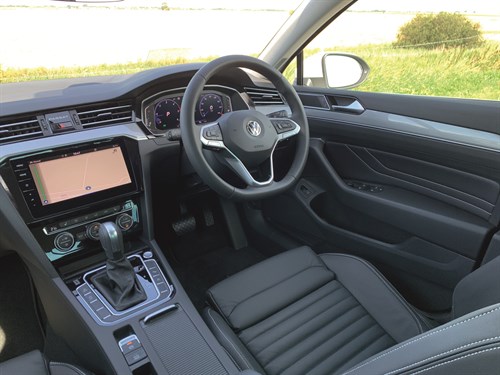
It made me wonder about whether this car was left on the production line for any period of time during the lockdown in the spring. It was delivered to us at the end of July, so it could have been left at some point in the production process and restarted, when factories were reopened with Covid-19 precautions in place.
I don't know about you, but if I've been interrupted in mid flow when writing - by a phone call, meeting or urgent email - it takes a while to get back into it, and some thought I might have had in my head that I was about to commit to print is lost forever.
And scaling this idea up to the UK car manufacturer employees at factories frequently dropping tools to strike in the 1970s, it definitely had a detrimental effect on the quality of the products.
Of course, this is just idle speculation by me at this stage (although if anyone has had cars delivered to their fleets in the second half of the year and encountered an unusually high proportion of problems with them, please get in touch!), and every other aspect of the Passat's service with us has been exemplary.
Its 150hp diesel engine has more than adequate performance, and the prospect of exceeding 800 miles on a full tank before needing to refuel is a rare pleasure.
Having to pay benefit-in-kind tax at 33% of its value, in what is an exceptionally clean and efficient diesel, is deeply disappointing.
But choosing one of these cars now would lead to the driver paying lower tax. Volkswagen is rolling out RDE2-compliant diesels, and for an identical specification car to our own, not only does it remove the 4% BIK tax supplement on diesel, it actually produced 6g/km less of CO2. It means someone taking delivery of a car now, virtually the same as ours, would be taxed at 27% of its value. Perhaps not enough to turn the tide back to diesel from PHEVs, but proves that they still have a role.
3rd Report: Light relief
LED headlights are becoming increasingly common as standard fitment in cars. Looking back 20 years ago, halogen bulbs were still prevalent, while xenon headlamps were mostly optional on high-end cars. They had a blue tinge, rather than the yellow glow of the halogen bulbs, and were significantly brighter.
I remember going on the media launch of the Vauxhall Vectra estate in 2003, which included a stint of night driving to show off the new bi-xenon headlights, which had xenon bulbs for main beam as well as the dipped headlights. They were extremely bright, and, of course, improved safety when driving on unlit roads at night.
Xenon headlights are now going out of fashion, and are being replaced gradually by LEDs. Due to multiple LEDs within a headlight it's possible to produce illumination even brighter than xenon lamps while using much less energy. That can help contribute to cutting a vehicle's CO2 emissions. In these times of reducing carbon footprints it's one of the reasons why LED has become popular.
A downside of LEDs, though, is that, unlike their lower-tech predecessors, they can't melt the snow that might collect on the headlights because they don't emit any heat.
However, overall, the safety benefits of a brighter beam should outweigh any small problems.

Our Passat has LED headlights as standard, and when choosing the specification we selected the IQ.Light LED Matrix option at a fairly steep £1,700, not forgetting that any increase in a car's P11D value through factory-fitted options also has an impact on BIK tax liability.
But as it's new technology to the Passat, we thought it was worth investigating the benefits, and as the nights have been drawing in during recent weeks we have been able to spend more time using them.
The LED set-up includes front and rear lamps - but at the front it is highly sophisticated when the headlights are in the automatic setting. This enables the automatic function of the main beam, and when selected it reverts to dipped headlights at low speeds - because at low speeds you don't need to see so far ahead - while at higher speeds a new, brighter illumination seems to be unveiled as curtains on a stage reveal a star performer.
The LED main beam shines well ahead, but a sensitive camera located at the top of the windscreen is on the lookout for lights from other road users ahead. Even rear lights several hundred metres away are enough to register, and then something special happens: the main beam remains on, apart from in the immediate vicinity of the vehicle ahead - and this shaded area is dynamic, able to move with oncoming traffic.
It means once the main beam is on at night, in the automatic headlights setting, it never really needs intervention from the driver to cancel it.
You might argue that it reduces the vigilance of the driver if he or she doesn't have to monitor the road ahead for other traffic and ensure the lights are dipped until it passes. But it's surely better that the driver isn't fumbling for the stalk at night and hoping to dip the headlights correctly the first time.
A few weeks into more frequent night driving, I'm quite used to them, and they have been effective enough not to incur the wrath of oncoming drivers with an angry flash of their lights to prompt action to stop dazzling them.
2nd Report: Is diesel more costly?
When we chose our Passat, we had the option of going for the more expensive PHEV version, and it's something we did consider for a while before plumping for the diesel.
The most visible aspect of disparity in cost is the purchase price. When Volkswagen first launched a plug-in hybrid version of the Passat in the previous-generation model the government was offering a grant towards the purchase price of plug-in hybrids.
That disappeared a couple of years ago, and while the SMMT was initially concerned that it might put a dent in the sales of alternative-fuel vehicles in the UK, the more favourable company car tax status of plug-in hybrids and the latest battery technology are driving extra sales.
However, our 150hp diesel Passat saloon has a P11D value of £31,435 for the standard SEL with optional DSG auto transmission. The entry-level Passat GTE plug-in hybrid is priced at £36,735 for the same 2020 model-year car as ours, so for it to be cheaper for a fleet to run that £5,000 price premium needs to be offset through lower running costs.
The plug-in hybrid has a higher residual value percentage, according to our data from KeeResources, at 32.6% compared with 30.5% for the diesel.
However, that higher P11D value still means the GTE loses more cash to depreciation over three years/60,000 miles, at 41.3p per mile compared with 36.4p per mile for the diesel.
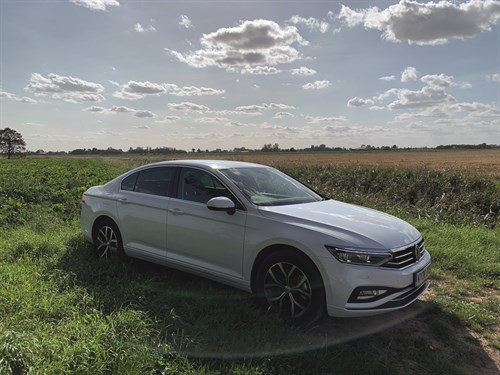
SMR costs aren't too far apart, with 4p per mile for the diesel (although according to our trip computer the car doesn't expect an AdBlue refill for another 12,500 miles) and 3.7p per mile for the GTE.
Fuel costs are based on official combined cycle data on the WLTP, and the diesel is quoted at 9.3p per mile, with the GTE requiring a more complex combination of electricity and petrol refuelling. The plug-in hybrid is quoted at 7.3p per mile.
The three running cost figures combined give the diesel a 2.5p per mile advantage over the GTE, although the fuel element is a variable. The official combined fuel consumption figure for the Passat is 53.3mpg and I'm routinely achieving 15% better than this, and even more on long motorway journeys. And I haven't even deployed the 'eco' driving setting yet.
Likewise for the GTE. If it's charged regularly and used mainly on short journeys its fuel costs will be even less than quoted. But if the driver has chosen it purely to avoid company car tax, and doesn't really care about plugging it in, then fuel will cost significantly higher than for the diesel.
Regarding other costs for employers, the first year Vehicle Excise Duty for the diesel is £215, reducing to £150 thereafter. For the GTE, the first year is zero, and it's £140 thereafter.
The Passat TDI attracts Class 1A National Insurance of £1,432 in 2020-21, thanks to its 33% BIK tax bracket (Volkswagen is now rolling out RDE2-compliant diesel versions of the Passat that would see this go down a little), while the GTE is just £507.
Company car tax for a higher-rate taxpayer in the diesel is around £346 a month for 2020-21, compared with around £122 a month for the GTE. So we can see the appeal of the plug-in hybrid to the driver.
But so far I have enjoyed the convenience of the diesel and the exceptional fuel consumption. With 2,500 miles on the clock I'll be taking the Passat this evening for only its third refuelling stop in seven weeks. No plugs and no waiting.
1st Report: Passat's time to shine
The upper-medium sector was once the heart of the fleet arena. In the era of the Ford Cortina and Vauxhall Cavalier, this was how company sales reps were put on the road, and one-upmanship could be found in engine size and the length of the equipment grade badge.
Now, in the era of the Ford Mondeo and Vauxhall Insignia, these cars have annual sales typically in four figures rather than five, but while the names might have changed for two of the biggest brands in the fleet sector, Volkswagen's Passat is a mainstay.
The Passat was launched in 1973, before the iconic Volkswagen Golf, and the name must resonate in a way that the Cortina or Cavalier didn't because it's still here.
The reason sales in the upper-medium segment, or D-sector, have diminished is because of the increased appeal of SUVs and premium-badge models. Even within the Volkswagen range, there is a model above the Passat - the Arteon - to try to compete with premium-badge rivals such as the BMW 4 Series Gran Coupé and Audi A5 Sportback.
And Volkswagen has decided to offer the more upmarket sibling in an estate as well as the four-door fastback from the soon-to-be-launched facelifted version.
While the upper-medium sector has lost some of its importance to user-choosers, it's a shrinking pool of talented cars.
The Skoda Superb has been a winner in this category in the Business Car Awards for the past few years, and, sharing much of its technology with the Volkswagen, the Passat must have its work cut out for recognition.
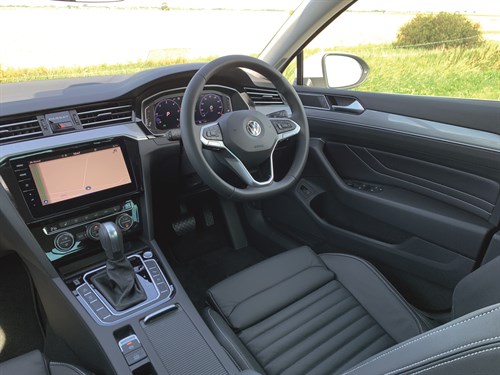
So why did we choose it? The Passat is still a strong seller in this sector - with sales similar to the Vauxhall Insignia, and dwarfing the volume of rivals such as the Ford Mondeo, Peugeot 508, Mazda6 and the Skoda Superb.
And we chose the latest version of Volkswagen's 2.0-litre diesel engine, despite all the negative associations with diesel in the mainstream media, which seems to be rubbing off on the behaviour of private car buyers.
With 150hp, and the DSG automatic, the Passat saloon just hits 130g/km, which is still a threshold for many fleets choosing ICE vehicles.
The Passat GTE would offer lower BIK tax, but policing charging is still difficult for fleet operators, and drivers still need the discipline to ensure they don't rely only on the vehicle's petrol engine.
Out Passat's official fuel consumption figure of 62.8mpg might impress under WLTP, but I've achieved as high as 76.0mpg according to the trip computer so far, and I'll verify what it's capable of at the next round of refuelling.
Our SEL might lack some of the presence of the R-Line, but it has smaller wheels and a more compliant suspension. Leather seats come as standard, as does satellite navigation and adaptive cruise control.
We've ticked a few extra boxes that perhaps show a user-chooser in a premium-badge car what they are missing for the money.
Standard equipment: Discover Navigation system including streaming and internet, adaptive cruise control, 17in alloy wheels, automatic dimming interior rear-view mirror, Bluetooth, Keyless Go, electrically adjustable backrest on driver's seat, road sign recognition, electronic parking brake, heated front seats, lane-keeping assistant, traffic jam assistant, rear privacy glass, leather seats.
Options: Upgraded dashboard screen with digital cockpit (£2,200), Matrix LED headlights (£1,700), Area view and rear-view camera (£835), Ambient lighting plus (£470), Metallic paint (£670)











